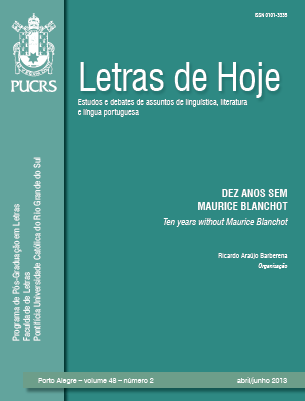Negativity and death in Maurice Blanchot’s thought
Keywords:
Negativity, Death, Literature, ImpossibilityAbstract
This paper undertakes a reading of Maurice Blanchot’s conception of death confronted with the Hegelian idea of force of negativity and Heidegger’s “being-towards-death”. Despite the echoes of the two predecessors, Blanchot gives another way to his thinking on death, deviating from Hegel and from the Heidegger of Sein und Zeit, performing a jump, associating the idea of death to art, to literature, to the space in which things may not be said clearly, in which there’s no authenticity neither in life nor in death, in which death is a continuous dying, that never starts and never ceases. The basic blanchotian text used for this research is “Rilke et l’exigence de la mort”, de L’espace littéraire.Downloads
Downloads
Published
How to Cite
Issue
Section
License
Copyright
The submission of originals to Letras de Hoje implies the transfer by the authors of the right for publication. Authors retain copyright and grant the journal right of first publication. If the authors wish to include the same data into another publication, they must cite Letras de Hoje as the site of original publication.
Creative Commons License
Except where otherwise specified, material published in this journal is licensed under a Creative Commons Attribution 4.0 International license, which allows unrestricted use, distribution and reproduction in any medium, provided the original publication is correctly cited.






